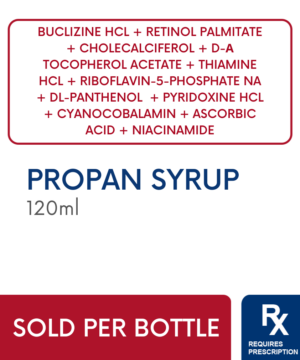Description
MOBIC 15MG TABLET
Description :
Meloxicam is 4-hydroxy-2-methyl-N-(5-methyl-2-thiazolyl)-2H-1,2-benzothiazine-3-carboxamide-1,1-dioxide.
Indications / Uses :
Symptomatic treatment of painful osteoarthritis (arthrosis, degenerative joint disease), rheumatoid arthritis, ankylosing spondylitis and similar conditions requiring anti-inflammatory treatment.
Administration :
May be taken with or without food: May be taken w/ meals if GI discomfort occurs.
Contraindications :
Patients with known hypersensitivity to meloxicam or any excipient of Mobic. There is a potential for cross-sensitivity to acetylsalicylic acid and other NSAIDs.
Mobic should not be given to patients who have developed signs of asthma, nasal polyps, angioedema or urticaria following the administration of acetylsalicylic acid or other NSAIDs.
Active peptic ulceration, severe hepatic insufficiency, nondialysed severe renal insufficiency, overt gastrointestinal bleeding, recent cerebrovascular bleeding or other bleeding disorders, severe uncontrolled heart failure; children and adolescents <12 years, pregnancy or breastfeeding.
Special Precautions :
As with other NSAIDs, caution should be exercised when treating patients with a history of gastrointestinal disease and in patients receiving treatment with anticoagulants. Patients with gastrointestinal symptoms should be monitored.
Mobic should be withdrawn if peptic ulceration or gastrointestinal bleeding occurs. Gastrointestinal bleeding, ulceration or perforation can occur at any time during treatment, with or without warning symptoms or a previous history of serious gastrointestinal events. The consequences of such events are generally more serious in the elderly.
Special attention should be paid in patients reporting mucocutaneous adverse events and consideration given to discontinuing Mobic. NSAIDs inhibit the synthesis of renal prostaglandins which play a supportive role in the maintenance of renal perfusion. In patients whose renal blood flow and blood volume are decreased, administration of an NSAID may precipitate overt renal decompensation which is typically followed by recovery to pre-treatment state upon discontinuation of nonsteroidal anti-inflammatory therapy. Patients at greatest risk of such a reaction are dehydrated patients, those with congestive heart failure, liver cirrhosis, nephrotic syndrome and overt renal disease, those receiving a diuretic, ACE inhibitor or angiotensin II receptor antagonist, or those having undergone major surgical procedures which led to hypovolemia. In such patients, the volume of diuresis and the renal function should be carefully monitored at the beginning of therapy.
In rare instances, NSAIDs may be the cause of interstitial nephritis, glomerulonephritis, renal medullary necrosis or nephrotic syndrome.
The dose of Mobic in patients with end-stage renal failure on hemodialysis should not be higher than 7.5 mg. No dose reduction is required in patients with mild or moderate renal impairment (ie, in patients with a creatinine clearance >25 mL/min).
As with other NSAIDs, occasional elevations of serum transaminases or other parameters of liver function have been reported. In most cases, these have been small and transient increases above the normal range. If the abnormality is significant or persistent, Mobic should be stopped and follow up tests carried out.
No dose reduction is required in patients with clinically stable liver cirrhosis.
Frail or debilitated patients may tolerate side effects less well and such patients should be carefully supervised. As with other NSAIDs, caution should be used in the treatment of elderly patients who are more likely to be suffering from impaired renal, hepatic or cardiac functions.
Induction of sodium, potassium and water retention and interference with the natriuretic effects of diuretics may occur with NSAIDs. Cardiac failure or hypertension may be precipitated or exacerbated in susceptible patients as a result.
Effects on the Ability to Drive or Operate Machinery: There are no specific studies about effects on the ability to drive vehicles and to use machinery. Patients who experience visual disturbances, drowsiness or other central nervous system disturbances should refrain from these activities.














Reviews
There are no reviews yet.